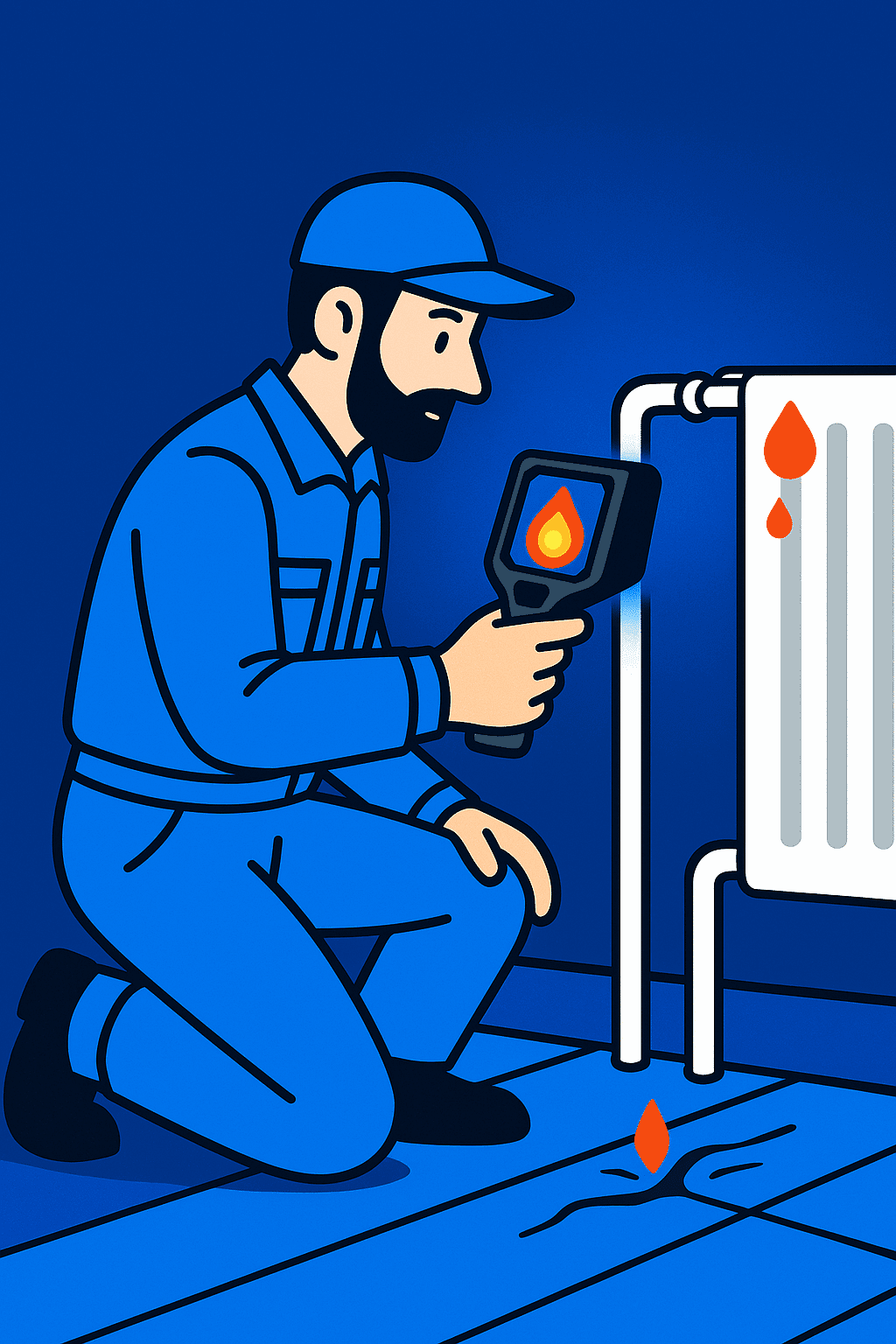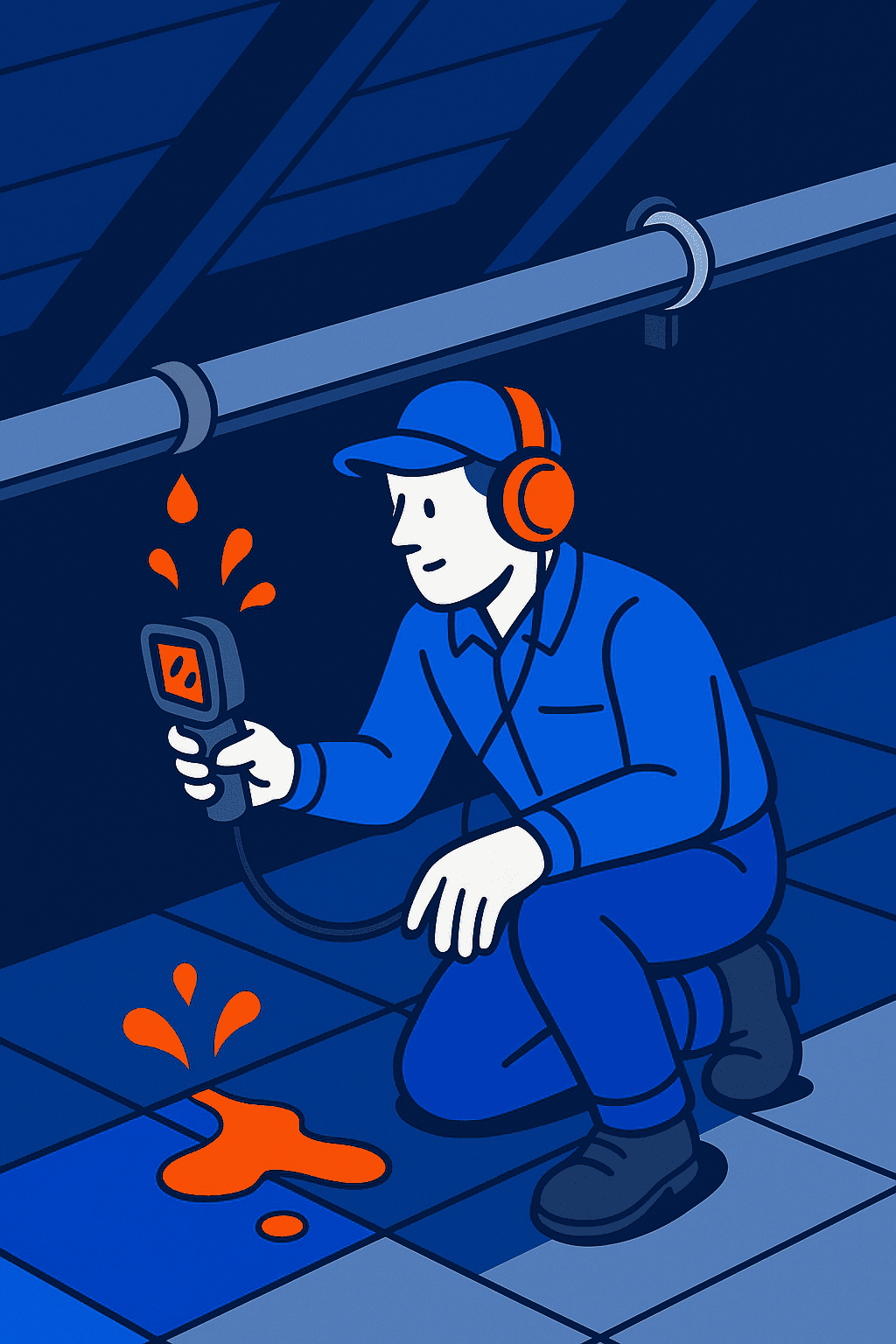Central Heating Leak Detection Specialists
Expert Central Heating leak detection services in Cornwall & Devon.
Contact Us Today!
Fast Reply Within 2 – 20 mins 🚀
↓ RESOLVE YOUR LEAK TODAY ↓
Central Heating Leak Detection in Cornwall & Devon
Boiler losing pressure again? Our acoustic and thermal imaging kit finds hidden heating leaks without ripping up your floors
📞 Call Now: 07822 025 911Boiler pressure dropping daily? Central heating leaks are cunning — hidden under floors and behind walls, they waste energy whilst slowly damaging your home. After decades detecting heating system failures across Cornwall and Devon, I’ve seen how micro-leaks cause boiler breakdowns and £1000s in floor damage. September brings a surge in calls — systems fail after summer dormancy when seals dry out and inhibitor concentration drops.
Our non-invasive detection combines acoustic listening and thermal imaging to pinpoint leaks within centimetres. No destructive digging or floor lifting. We understand Southwest heating patterns — from clay soil movement cracking pipes in Devon to granite foundation shifts in Cornwall. Finding a leak in central heating system requires expertise that extends beyond basic plumbing — our trace and access plumbers work with insurance companies to ensure proper documentation. Get professional leak detection before a small leak becomes a major repair.
Central heating leaks cost UK households £400 annually in wasted energy and water. In our maritime climate, damp from heating leaks accelerates timber rot and mould growth. Modern sealed systems run at higher pressures, making micro-leaks particularly damaging as they weaken system efficiency whilst remaining virtually invisible. Detecting leaks in central heating system requires understanding both water flow patterns and building construction — issues that also affect our water leak detection services.
Unlike emergency plumbers who guess locations, our systematic approach uses acoustic leak detection to hear escaping water through solid floors. Combined with thermal imaging leak detection for hot pipe tracking, we achieve 96% accuracy on pressurised heating systems. This precision matters when finding leaks in central heating pipes where access is limited.
How We Detect Central Heating Leaks Without Destruction
Central heating water leak detection requires precision — water under 1-3 bar pressure creates distinct acoustic signatures. We combine four proven methods for comprehensive detection, techniques also used in our commercial leak detection projects.
Acoustic Detection
Sensitive microphones detect water escape sounds through floors at 800-2000Hz. Perfect for pressurised heating circuits — locates leaks within 0.3m accuracy.
Thermal Imaging
FLIR cameras reveal heat patterns from escaping hot water. Essential for underfloor heating systems.
Tracer Gas Detection
Inert gas injected into drained systems — detectors find escape points even through concrete. Ideal for micro-leaks. See our tracer gas leak detection methods.
Pressure Testing
System pressurisation reveals leak severity and location zones. Critical first step for accurate detection planning and repair priority assessment. Similar methods apply to our mains water leak detection services.
Method selection depends on system type and suspected leak location. Thermal imaging excels for flow pipes; acoustics for return circuits. Tracer gas penetrates the tightest spaces, detecting leaks through multiple floor layers in older properties. When tracing a leak in central heating system, we often combine methods for maximum accuracy, particularly in complex installations that might also require our plumbing leak services.

10 Signs Your Central Heating Has a Leak
Recognise these early warning signs to prevent costly damage in Cornwall and Devon’s variable climate conditions.
Boiler gauge falling below 1 bar overnight
Sections not heating despite bleeding
Short heating cycles from low pressure
On walls or ceilings near heating pipes
System working harder due to leaks
Brown marks from rusted heating water
Air in system from pressure loss
Underfloor pipes leaking hot water
Rust spots from diluted inhibitor
Excess moisture from hidden leaks
⚠️ September Surge:
Heating system failures peak in September after summer dormancy. Seals dry out, inhibitor settles, and first pressure tests reveal winter vulnerabilities. Book early detection to avoid emergency calls.
These symptoms often compound — pressure drops cause boiler short-cycling, reducing efficiency by 15-25%. In Cornwall’s granite areas, building movement during wet seasons can crack heating pipes, whilst Devon’s clay expansion-contraction cycles stress joint connections. As your central heating leak finder, we understand these regional patterns affect detection methods. Underground pipe failures, similar to those in our underground water leak detection work, require specialized location techniques.
Early detection prevents system damage. Once inhibitor dilutes from repeated refilling, radiators corrode rapidly, requiring expensive replacement rather than simple leak repair.
Our Central Heating Leak Detection Process
Systematic, non-destructive approach protects your home whilst finding leaks efficiently. Our central heating system leak detection methods apply similar precision to related services including swimming pool leak detection where pressurised systems require careful analysis.
System Assessment & Consultation
Evaluate heating system type, identify leak patterns, and plan detection strategy based on your symptoms.
Pressure Testing & Initial Detection
Test system pressure, isolate leak zones, and use acoustic methods to narrow suspected areas.
Precision Location & Verification
Apply thermal imaging or tracer gas for exact positioning, then verify findings with multiple detection methods.
Detailed Reporting & Repair Guidance
Provide comprehensive report with photographs, repair recommendations, and insurance documentation if required.
Process typically takes 2-4 hours depending on system complexity and leak location. We work methodically to avoid missing secondary leaks — heating systems often develop multiple failure points simultaneously.
Post-detection, we advise on repair access, system flushing requirements, and inhibitor replacement to restore full heating efficiency.
Why Central Heating Systems Fail After Summer
Understanding the science behind September heating failures helps prevent annual breakdowns.
Inhibitor Chemistry: Central heating systems contain corrosion inhibitor — typically molybdate-based compounds that protect steel pipes. During summer shutdown, inhibitor settles and concentrates. When systems restart and leak water is replaced with fresh water, inhibitor dilutes to ineffective levels, accelerating corrosion and joint failures.
Seal Degradation: Rubber seals and gaskets dry out during months of non-use. First pressurisation in autumn stresses brittle seals, causing micro-failures that worsen throughout winter. Modern EPDM seals last longer than traditional rubber, but all benefit from annual system checks.
Pressure Cycling Stress: Summer temperature changes cause pressure fluctuations even in inactive systems. Repeated expansion and contraction fatigues pipe joints, particularly compression fittings and radiator valve connections.
This explains why 60% of our central heating leak calls occur September-November. When you need to find leak central heating system quickly, preventive inspection before heating season prevents emergency failures.
Central Heating Leak Types We Detect
Boiler Internal Leaks
Heat exchanger pinholes and seal failures. Often pressure-related — thermal imaging reveals hot spots indicating internal water paths.
Radiator & Valve Leaks
TRV failures, radiator corrosion, pipe joint seepage. Acoustic detection pinpoints exact valve or connection point.
Underfloor Heating Pipe Leaks
Screed-buried pipes from building movement or installation damage. Links to our underfloor heating leak detection specialists.
Distribution Pipe Failures
Flow and return pipe leaks under floors, in walls, or buried external runs. Tracer gas excels for inaccessible locations.

Each leak type requires specific detection approaches. Boiler leaks need thermal analysis of heat exchanger patterns. Underfloor systems require tracer gas due to concrete barrier penetration. Radiator leaks respond well to acoustic methods due to accessible pipe runs.
We also detect expansion vessel failures, pump seal leaks, and system contamination issues that mimic leak symptoms. Comprehensive diagnosis prevents unnecessary repairs. When central heating pipe leak detection reveals multiple issues, we coordinate with specialists handling everything from foundation leaks (requiring our slab leak detection expertise) to complete system analysis.
Boiler Types & Common Leak Patterns
Different boiler designs have characteristic failure points we understand through decades of experience.
Combination Boilers
Diverter valve seals, plate heat exchanger leaks, pressure relief valve failures. Compact design makes internal leaks challenging to isolate.
System Boilers
Expansion vessel connections, pump seal leaks, internal circulation failures. Separate components allow easier leak isolation and detection.
Conventional Boilers
Feed and expansion tank overflows, gravity circulation problems, cylinder coil leaks. Older systems prone to corrosion-related failures.
Combi boilers account for 75% of new installations but show higher leak rates due to complex internal hydraulics. System boilers offer better leak detection access but require external component checks. Conventional boilers have obvious overflow indicators but hidden circulation leaks.
We adapt detection methods to boiler type — thermal imaging for combi internal analysis, acoustic testing for system boiler external components, tracer gas for conventional hidden pipework.
Why Choose DCI for Central Heating Leak Detection?
Four decades of heating system expertise with modern detection technology.
Multi-Method Detection
Acoustic, thermal, and tracer gas capabilities for comprehensive leak location
System Knowledge
Experience with all boiler types and heating configurations
Insurance Reports
Detailed documentation for trace & access claims
Regional Expertise
Understanding of Cornwall/Devon building challenges and heating patterns
Non-Destructive Focus
Protect expensive floor coverings and decorations during detection
Post-Detection Support
Repair guidance, system health advice, and prevention recommendations
Our systematic approach prevents the expensive floor damage that results from guesswork excavation. Professional detection saves both time and disruption costs.
Heating Pipe Materials & Leak Characteristics
Copper Pipes
Pinhole corrosion from aggressive water, joint solder failures. Acoustic detection excellent for copper due to sound transmission properties.
Plastic Pipes (PEX/Polybutylene)
Fitting connection failures, rodent damage, UV degradation near windows. Tracer gas needed due to sound dampening properties.
Steel Pipes
Corrosion throughout length, threaded joint failures, rust scale blockages. Thermal imaging shows corrosion heat patterns.
Microbore Copper
Compression fitting failures, tube crushing damage, sludge blockages mimicking leaks. Requires careful pressure testing.
Material knowledge guides detection method selection. Copper systems respond well to acoustic detection due to excellent sound transmission. Plastic pipes need tracer gas as they dampen acoustic signals. Steel systems show thermal signatures from corrosion activity.
In Cornwall and Devon, copper systems dominate but increasingly PEX plastic installations require specialist detection approaches. We stock detection equipment optimised for each material type.
Regional Heating Challenges in Cornwall & Devon
Local factors that increase central heating leak risks and affect detection methods.
Clay Soil Movement: Devon’s clay soils expand up to 15% between wet and dry seasons. This ground movement stresses buried heating pipes and can crack concrete floors containing underfloor heating. External heating pipes to outbuildings are particularly vulnerable. A leak in central heating pipe often occurs at stress points where pipes pass through walls or floors during soil movement cycles.
Granite Foundation Shifts: Cornwall’s granite geology creates localised settlement patterns. Older properties experience slight movement that stresses rigid heating pipe connections, particularly where pipes pass through foundation walls.
Coastal Corrosion: Salt air accelerates corrosion of external heating components — flue terminals, external pipes, and condensate drains. Properties within 5 miles of coast show 40% higher heating system component failure rates.
Maritime Climate Damp: High humidity from Atlantic weather systems accelerates heating system corrosion when combined with frequent heating cycling. Condensation in heating circuits becomes more problematic than in drier climates.
Understanding these regional factors helps us predict likely leak locations and select appropriate detection methods. Whether you’re searching for “central heating leak detection near me” or need specialist help with gas heating components, see our gas leak detection services.
Your Central Heating Leak Action Plan
What to do immediately when you suspect a heating system leak:
Check boiler pressure
Note current reading and monitor for drops over 24 hours
Document symptoms
Photograph pressure gauge, damp patches, and any visible water damage
Isolate affected areas
Turn off individual radiators if leak suspected in specific rooms
Protect belongings
Move valuables from areas showing damp or water damage
Schedule professional detection
Call 07822 025 911 for expert leak location and advice
Avoid temporary leak sealers — they mask problems and can damage detection equipment. Professional location followed by proper repair saves money long-term.
Preventing Central Heating Leaks
Maintenance steps that reduce leak risks and extend system life:
Annual system service
Professional boiler service including leak checks
Inhibitor maintenance
Test and refresh corrosion inhibitor annually
Pressure monitoring
Check boiler pressure weekly during heating season
Temperature control
Avoid extreme temperature cycling
Early detection
Address pressure drops immediately
System flushing
Power flush every 5-7 years to remove sludge
Preventive maintenance costs fraction of leak repair and system replacement. Properties with annual servicing show 75% fewer heating leaks than neglected systems.
Environmental Cost of Central Heating Leaks
Hidden leaks waste energy and water whilst increasing carbon emissions from inefficient heating.
Leaking heating systems consume significantly more energy maintaining temperature and pressure. Early detection reduces environmental impact whilst saving money on energy bills.
Ready to Find Central Heating Leak Issues?
Stop energy waste and prevent damage with professional leak detection. Our non-destructive methods locate leaks precisely without disrupting your home.
📞 Call Now: 07822 025 911Cornwall & Devon
Professional Reports • Non-Invasive • Expert Analysis
Serving Cornwall & Devon
Based in Saltash with rapid response across the Southwest. Professional central heating leak detection from Truro to Exeter.
Expert Central Heating Leak Detection in Cornwall & Devon
Services in populated areas like:
Plymouth • Exeter • Truro • Torquay • Paignton • Barnstaple • Newton Abbot • St Austell • Falmouth • Penzance • Camborne • Redruth • Tiverton • Newquay • Brixham • Bodmin • Teignmouth • Helston • Bideford • St Ives
Frequently Asked Questions About Central Heating Leak Detection
How long does central heating leak detection take?
Central heating leak detection typically takes 2-4 hours to complete. Simple pressure tests and acoustic detection can be finished in 2 hours, while complex underfloor pipe leaks may require 4-6 hours. Factors affecting timing include system size, leak location, and access difficulties.
Why does my boiler keep losing pressure?
Boiler pressure drops indicate either a system leak or boiler fault. Around 40% of pressure loss issues are boiler component failures (expansion vessel, pressure relief valve), whilst 60% are heating system leaks. Professional diagnosis determines the exact cause before expensive repairs.
Can you detect central heating leaks without damaging floors?
Yes, modern central heating leak detection is completely non-destructive. We use acoustic listening, thermal imaging, and tracer gas methods to locate leaks within 0.3m accuracy without lifting floors or damaging decorations. Only final repair access requires minimal excavation.
Should I use central heating leak sealer?
No, avoid leak sealers – they mask problems temporarily whilst potentially damaging detection equipment and voiding boiler warranties. Professional leak location followed by proper repair costs less long-term than repeated sealer applications and eventual system damage.
Will insurance cover central heating leak detection?
Most UK home insurance policies include “trace and access” cover for leak detection. This typically covers investigation costs, access damage, and restoration work. Check your policy or call your insurer before booking – many clients get full reimbursement.
How accurate is central heating leak detection?
Professional central heating leak detection achieves 96% accuracy using multiple detection methods. Acoustic detection locates pressurised leaks within 0.3m, thermal imaging shows hot water escapes precisely, and tracer gas detects micro-leaks through concrete floors.
What's the difference between combi and system boiler leaks?
Combi boilers develop internal heat exchanger leaks and diverter valve failures – harder to isolate. System boilers typically leak at external connections, expansion vessels, and pump seals – easier to detect and access. Detection methods vary accordingly.
Can central heating leaks cause structural damage?
Yes, undetected heating leaks cause serious structural problems. Hot water damages timber floors, creates foundation settlement, and accelerates steel beam corrosion. In Cornwall/Devon, clay soil movement from leaks destabilises building foundations within months.
What are micro-leaks in central heating systems?
Micro-leaks are pinhole-sized failures causing gradual pressure loss without visible water. Hot water evaporates quickly, leaving no evidence. These 1-2mm failures account for 30% of heating system pressure drops and require specialist detection equipment.
How do I know if it's a heating leak or boiler fault?
Test by isolating the heating circuit – if pressure still drops with heating off but hot water on, it’s likely a boiler fault. If pressure only drops when heating runs, suspect system leaks. Professional diagnosis prevents unnecessary boiler replacement.
